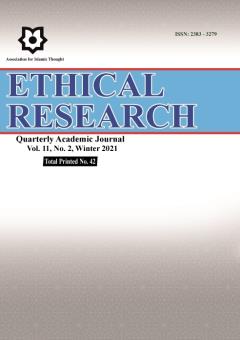Ethical requirements in Islamic banking
Subject Areas : Ethics and Islamic EducationAli Arabi 1 , Mahmoud Bagheri 2 , mahmoud erfani 3
1 -
2 - Tehran University
3 -
Keywords: morality, Islamic Banking, regular banking, profit, usury, time, Salaf Nesiyeh..,
Abstract :
A saying from the Holley Prophet of Islam says: “praying has 70 parts, the best one is Halal earning”. Accordingly the real believers strongly value the professional banking morality for earning Halal income and from their point of view the bank which is based on Islamic morality must follow 6 important aims as will be described in the article such as executing economic justice in the society. As a result the idea of Islamic Banking was first made in the 1950s and the first Islamic investment banking was established in Egypt and Malaysia in the 1960s. There are over 100 kinds of Islamic banks and the law of banking without usury was passed and enforced in 1983 after Iran Islamic revolution. The theoretical, religious jurisprudence and Islamic morality related discussions among the people who are the users of this method of banking and among the bank clerks who enforce this methods, is yet to be answered and they are not fully justified that this method is right from the religious point of view, and the money taken and given is usury. We have tried to survey the activities of the banks focusing on monetary value of time and value of money during time in Islamic jurisprudence and find an appropriate answer. It is clear that the banks pay profit to customers when attracts their money and receives profit from them when loans them. These two issues happen during time and the method of paying and taking profit separates the way of Islamic banking from regular banking. Usury that is clearly forbidden in Islam takes place in elapse of time. We have used indisputable contracts in religious jurisprudence such as Salaf (buying in advance) and Nesiyeh (selling in advance) to differentiate these two with usury.
قرآن¬کریم
باقری محمود، رحمانی سعید، حمایت از حقوق مصرف کننده در نظام بانکی، پژوهشکده پولی بانکی بانک مرکزی، تهران، 1396
عیوضلو، حسین، کریمی، مجید، شناسایی و اندازهگیری شاخص عدالت و کارایی در نظام بانکی؛ موردمطالعه: بانک توسعه صادرات ایران، استان اصفهان، دوره 8، شماره 15، پاییز و زمستان 1394
السان، مصطفی، حقوق پرداختهای بانکی، تهران، پژوهشکده پولی و بانکی بانک مرکزی، 1390
توتونچیان، ایرج، اقتصاد پولی، بانکداری، تهران، پژوهشکده پولی و بانکی بانک مرکزی، 1375
زمانی فراهانی، مجتبی، پول، ارز و بانکداری، تهران، ترمه، 1389
ماجد، علی، گلریز، حسن، پول و بانک از نظریه تا سیاستگذاری، بانک مرکزی جمهوری اسلامی ایران، مرکز آموزش بانکداری، تهران، 1367
حسینی بهشتی، سید محمد، بانکداری، ربا و قوانین مالی اسلامی، بنیاد نشر آثار و اندیشههای شهید دکتر بهشتی، تهران، 1387
زمانی فراهانی، مجتبی، بانکداری خارجی، ترمه، تهران، 1385
بهنود، محمد و سایرین، بانکداری داخلی یا تجهیز منابع، موسسه عالی آموزش بانکداری ایران ، تهران، 1389
حسینی دولتآبادی، سید مهدی، هجدهمین نشست نقد پژوهشهای بانکداری و مالی اسلامی (سلسله جلسات نقد و بررسی پژوهشهای بانکداری و مالی اسلامی(، «ماهیت بانک و دلالتهای آن برای مطالعات بانکداری اسلامی»، ۱۳۹۵
ملاکریمی خوزانی، فرشته، بررسی مبانی دریافت جریمه دیرکرد و خسارت تأخیر تأدیه در نظام بانکی، ویژه نامه بانکداری اسلامی، 1390
زمانی، محمود، نقش زمان و مکان در اجتهاد از دید شهید صدر، نقد و نظر، سالدوم، ش.5
زاهدی وفا، محمدهادی، پیغامی، عادل، پول و زمان در نظریه توزیع اقتصاد اسلامی، مطالعات اقتصاد اسلامی، سال دوم، ش.یک، 1388


